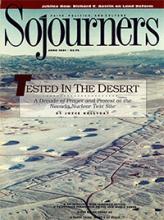I stopped in a Conoco gas station in Rapid City, South Dakota, not long after President Bush saved America from Saddam Hussein's hordes. Hanging on the wall was a photocopy of a poster that contained a silhouette of an Arab sitting on a camel, both encircled by a target. Above this picture were the words, "I'D FLY TEN THOUSAND MILES TO SMOKE A CAMEL."
Not wanting to cause trouble, I merely told the attendant that the poster was both demeaning and dangerous to people of Arab descent. It was obvious that mine was the first negative reaction he'd had to the poster, because all that came from his mouth was something sounding like the famous Jackie Gleason dodge, "Ahumma, humma, humma, humma."
Somehow it seems trivial to talk about this kind of an insult when all around me I see the daily desperation of American Indians, of American blacks and others whose lives are on the line each day when they wake up. But Arab Americans have been taking their turn as a target for some years now, and it is in fact becoming much more dangerous.
In 1985, Alex Odeh, a Palestinian American, was murdered by what the FBI termed "Jewish extremists" in Santa Ana, California. The murder was committed during the height of the publicity surrounding the Achille Lauro hijacking. The American-Arab Anti-Discrimination Committee's (ADC) violence log confirms that each time a crisis bubbles up in the Middle East, something bad happens to Arab Americans here in the United States.
Read the Full Article
